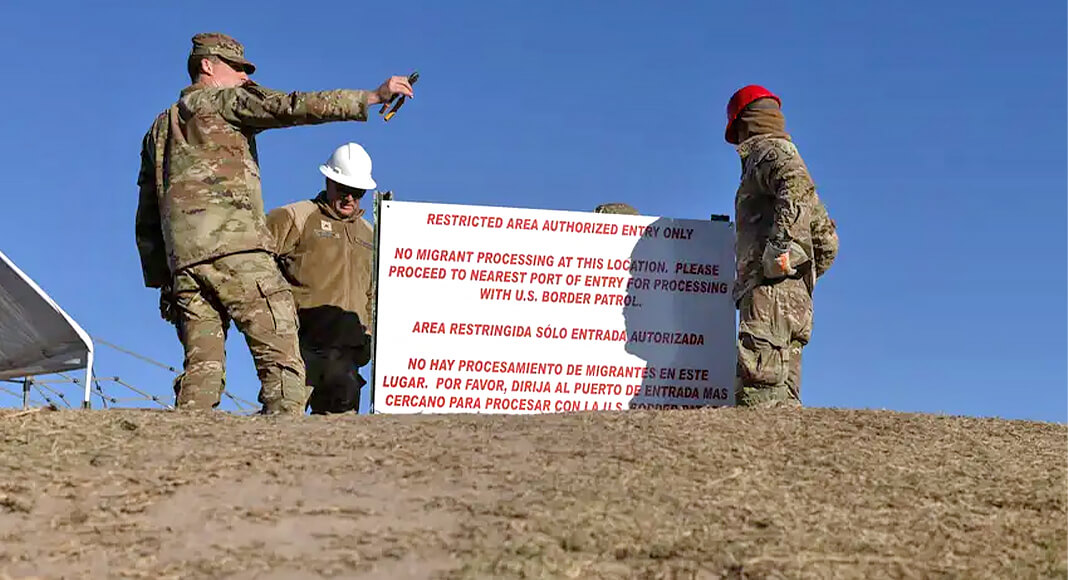
The Texas Tribune
BY MARÍA MÉNDEZ / THE TEXAS TRIBUNE
Texas lawmakers in 2023 approved Senate Bill 4, which allows Texas police to arrest people for illegally crossing the Mexico border. It was expected to go into effect in early March, butlegal challenges from the U.S. Justice Department and immigration advocacy organizations have repeatedly prevented the law from going into effect as litigation makes its way through federal courts.
A federal appeals court on late Tuesday night once again blocked the state of Texas from enforcing the law — hours after the U.S. Supreme Court had allowed the law to go into effect while the federal court case continued.
What is Senate Bill 4?
This new law would make it a state crime to cross the Texas-Mexico border between ports of entry. If a police officer believes they have evidence that a person illegally crossed the Rio Grande, that person could be charged with a Class B misdemeanor, which carries a punishment of up to six months in jail. For subsequent offenses, the person could be charged with a second-degree felony and face up to 20 years in prison.
If the migrant is convicted and has served their sentence, a judge would be required to order police to transport them to a port of entry. A judge could drop the charges if a migrant agrees to return to Mexico, and police could turn over migrant families to Border Patrol agents to avoid separating children from their parents instead of arresting them.
Is the law being enforced?
A federal appeals court order has blocked the law ahead of a scheduled hearing in the lawsuit brought forward by immigrant rights advocates and the federal government. This came hours after the U.S. Supreme Court on March 19 issued an order allowing the state of Texas to enforce SB 4 as challenges to the law proceed in federal court. Just one day before, the high court had extended a temporary court order blocking the law from going into effect.
Could any undocumented immigrant be arrested?
The bill allows police to question and arrest anyone they believe entered Texas through Mexico illegally and is currently without legal immigration status. However, the author of the law has said it is meant to target people who recently crossed the border, not undocumented immigrants who have been living in Texas for years. Texas’ statute of limitations blocks legal proceedings for misdemeanors two years after an offense has occurred. The statute of limitations is three years for many felonies.
SB 4 prohibits police from arresting migrants in public or private schools; churches and other places of worship; health care facilities; and facilities that provide forensic medical examinations to sexual assault survivors. The bill doesn’t prohibit arrests on college or university campuses.
Why is the law being challenged?
Immigration advocacy organizations and the Department of Justice say the law encroaches on the federal government’s sole authority over immigration and will lead to racial profiling by police. Texas officials have argued the state needs to step in because the federal government isn’t doing enough to stop illegal immigration.
Can Texas enforce immigration laws?
Federal courts, including the U.S. Supreme Court, have previously ruled that immigration laws can only be enforced by the federal government. Texas has argued the law follows federal immigration laws, and that the state has a right to defend itself under Article I, Section 10 of the U.S. Constitution, which prohibits states from engaging in war on their own “unless actually invaded.” A federal judge who blocked the law in February said he didn’t see evidence of a war in Texas and that the federal government would “suffer irreparable harm” under the law because it could inspire other states to pass their own immigration laws.
How could this affect asylum seekers?
Anyone who enters the U.S., legally or illegally, has up to one year to request asylum.
The federal government is asking migrants to not show up at a port of entry and instead make an appointment to meet with an immigration officer. But available appointments fill quickly and many migrants opt to cross the border away from ports of entry and surrender to U.S. authorities.
Under SB 4, if Texas police arrest a migrant before they surrender to Border Patrol, immigrants who apply for asylum and are researched by federal agents for criminal histories could be subject to removal from the United States if charged with the new state crime.
Where can I find more information?
Consulates in the U.S. for countries like Mexico could provide their citizens with more information. Immigrant rights groups, such as American Gateways, are also trying to inform people who could be affected by the law. The American Civil Liberties Union of Texas, which is one of the groupssuing Texasover SB 4, has published information about people’s rights when it comes to the law and interactions with Texas police.













